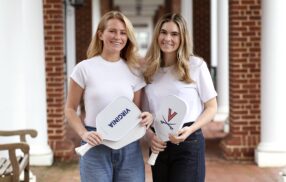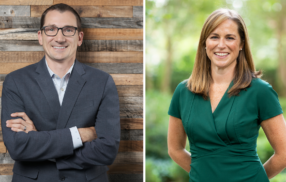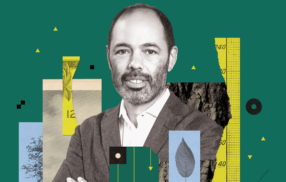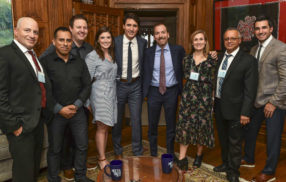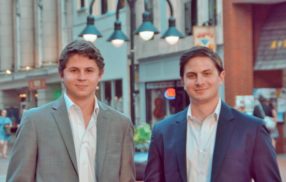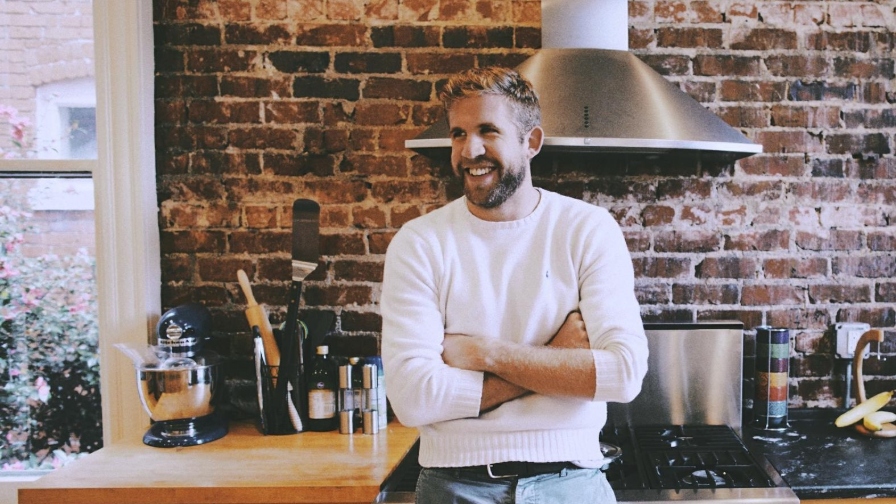
UVA Darden Executive MBA Student Launches Micro-Finance Startup to Support Local Agriculture
By Brett Twitty
University of Virginia Darden School of Business Executive MBA student Hunter Hopcroft (Class of 2020) was recently interviewed about about his agricultural micro-finance organization, Slow Money Central Virginia, for NPR’s Full Disclosure radio show. The episode, “Seed Capital ,” focuses on farmers, the environment and business. The episode will be aired the weekend of 2–3 March and is available to stream online now.
Slow Money Central Virginia was formed in 2018 with a mission to support the financial needs of small-scale organic farms and food entrepreneurs in the local foodshed, including both urban and rural areas. The organization’s initial focus was Central Virginia, but it’s now expanding its footprint throughout Virginia. Hopcroft spoke with the Discover Darden blog to explain more about agricultural micro-finance and how his Darden experience is shaping his current work.
What is agricultural micro-finance?
There are capital investments between $10,000—50,000 that can transform many farm businesses. The reality, though, is that there is simply not a good source for financing at those levels. The loans are too small for banks, and the returns are not attractive enough for equity investors. I started Slow Money Central Virginia with a friend in Charlottesville to address this need and make low- or no-interest loans for farm projects.
These investments often take many different forms. They might be buying a piece of equipment, cultivating more acres or building a greenhouse — really, anything that extends the farm season or makes the land more productive. The U.S. Department of Agriculture reports that until a farm earns around $350,000 per year in revenue, the farmer likely has a second, off-farm job. Our goal is help farms grow to a level of financial sustainability that matches their environmental sustainability.
What attracted you to this work?
I started my career in portfolio management, but spent the last several years opening and working in local food-based businesses, like JM Stock in Charlottesville. When I got to know farmers and understand their businesses a little better, it became clear that many simply lacked access to capital to grow to a more stable level. The farming business is unavoidably seasonal, which makes cash management very important and capital investments riskier. Micro-finance was an opportunity to apply my knowledge of finance to an area I was passionate about, with outcomes that were tangible.
Why are you passionate about agricultural micro-finance?
The industrial food system has decimated what used to be a major source of local economic activity and a driver of employment. Now, less than 2 percent of the United States population are farmers, yet agriculture still accounts for around $1 trillion of the country’s GDP. The average age of a U.S. farmer is over 60. That 2 percent is either going to drop to zero, or agriculture is going to be a generational entrepreneurial opportunity. I’m betting on the latter.
Why did you decide to pursue an MBA?
I grew up around entrepreneurship. My parents have started and run businesses together since I was born, and business and its challenges have always been a part of my life. A Darden MBA has been a goal of mine since I was a sophomore in college, but starting my own business really exposed areas of weakness around management, culture and leadership. These experiences helped me realize now was the time for me to go back to school.
Is your experience at Darden helping you with your agricultural micro-finance endeavors?
Absolutely! Most farms are a factory, a retail store and a distributor all-in-one, so thinking with an enterprise perspective is absolutely crucial to figuring out the best way to help these businesses grow.
This story originally appeared on Darden Admissions’ Discover Darden blog.
The University of Virginia Darden School of Business prepares responsible global leaders through unparalleled transformational learning experiences. Darden’s graduate degree programs (MBA, MSBA and Ph.D.) and Executive Education & Lifelong Learning programs offered by the Darden School Foundation set the stage for a lifetime of career advancement and impact. Darden’s top-ranked faculty, renowned for teaching excellence, inspires and shapes modern business leadership worldwide through research, thought leadership and business publishing. Darden has Grounds in Charlottesville, Virginia, and the Washington, D.C., area and a global community that includes 18,000 alumni in 90 countries. Darden was established in 1955 at the University of Virginia, a top public university founded by Thomas Jefferson in 1819 in Charlottesville, Virginia.
Press Contact
Molly Mitchell
Associate Director of Content Marketing and Social Media
Darden School of Business
University of Virginia
MitchellM@darden.virginia.edu



